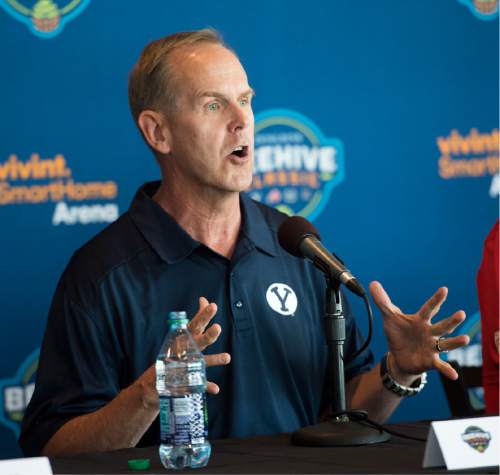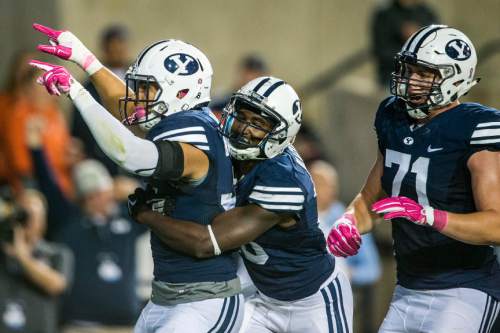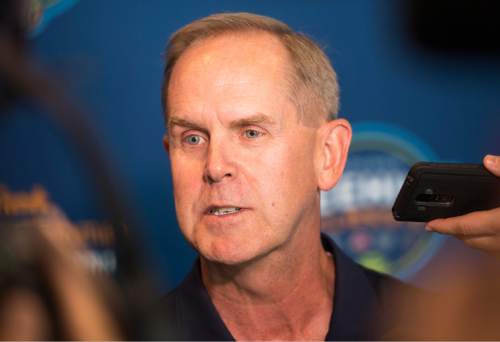This is an archived article that was published on sltrib.com in 2016, and information in the article may be outdated. It is provided only for personal research purposes and may not be reprinted.
Provo • Just when the Big 12 Conference's plan to expand by two or four teams was gaining some speed, the league's television partners pumped the brakes on the whole deal Monday.
It appears that ESPN and Fox Sports aren't quite as sold on the notion of Big 12 expansion, according to Sports Business Journal. The publication reported on its sportsbusinessdaily.com website that the networks believe the Big 12 expanding with schools from outside the Power Five conferences will "water down" the conference and make it less valuable from a television revenue standpoint.
Meanwhile, BYU athletic director Tom Holmoe conducted a regularly scheduled quarterly department meeting on Monday morning, but told the coaches and others present precious little about the Big 12 expansion situation. Holmoe said the process could last days, weeks or even months.
Last week, several top-level leaders from The Church of Jesus Christ of Latter-day Saints, the faith that owns and operates BYU, visited the athletic department offices and met with high-level department heads, sources said.
BYU is governed by a Board of Trustees that includes church president Thomas S. Monson and his counselors, Henry B. Eyring and Dieter F. Uchtdorf, among others. Ultimately, it is the Board of Trustees, and not president Kevin Worthen or Holmoe, that will decide the direction of BYU's athletic program.
Several recruits have said in the past few weeks that BYU coaches have told them the school's prospects of being invited into the Big 12 look favorable, but are not certain.
Also Monday, Scout.com's Horns Digest, a Texas athletics-focused website, reported that "there's definitely movement" toward expansion from the Big 12 recently.
"Cincinnati, Houston and BYU have been the most talked-about expansion candidates, almost from the moment the Big 12 Board of Directors voted to actively evaluate two to four expansion candidates on July 19," the report said.
It added: "BYU is independent and has a TV deal with ESPN, making the Cougs somewhat nimble in a move to the B12." Exit fees won't be an issue for independent BYU, and language in its future game contracts calls for them to be canceled without payment if BYU is ever admitted into a Power Five conference.
On the other hand, American Athletic Conference bylaws require a $10 million payment to depart, a hefty price tag for the likes of Houston, Cincinnati, Memphis and UConn, the four AAC schools most often mentioned as expansion candidates.
Whether Monday's revelation regarding the television angst is good, or bad, news for BYU is debatable. BYU is seen by many as the only candidate that could potentially add value to the conference.
Although ESPN and Fox balking at expansion could foreseeably diminish the chances of it happening, BYU still appears to be the strongest candidate if the networks have their say, according to Dennis Dodd of CBSSports.com.
And BYU officials have continually said their relationship with ESPN has been strong since a contract was worked out between the school and network when BYU announced in 2010 that it was breaking away from the Mountain West Conference in football and becoming independent. ESPN officials have praised the agreement as recently as three months ago and acknowledged BYU as a fairly substantial television draw.
The eight-year contract that gives ESPN the right to televise every home BYU football game but one, per year, expires after the 2018 football season.
Two weeks ago, Big 12 commissioner Bob Bowlsby was given clearance by the conference's 10 members schools to begin researching the league's expansion candidates and begin negotiations with those which best suited a criteria that included overall athletic department strength, fan base size, academic profile, reputation and media market size.
BYU quickly jumped to the top of the list, if it wasn't there already, according to most national college football observers.
In a story published Monday on ESPN.com, that website detailed Oklahoma president David Boren's role in the situation and noted, the "Sooners have long believed to have had their eye on BYU, which has the strongest football brand of any non-Power 5 school. The Cougars also have a national following through the Mormon Church, and operate near Salt Lake City, a top-35 TV market."
Oklahoma and Texas are seen as the major power brokers in the Big 12, and Texas officials last month threw their weight behind Houston.
Quoting unnamed sources on Monday, SBJ said the networks don't want to pay an additional $40 million per year in rights fees, or $80 million if the league expands by four teams.
The Big 12's TV deal currently pays $2.6 billion over 13 years. Each school makes about $20 million annually from that deal, then whatever else it can get from its so-called Tier 2 and Tier 3 television arrangements.
When it announced its plans to explore expansion, the Big 12 acknowledged it has some financial motivation to add 2-4 more teams because a clause in the media deals says it will receive pro-rata increases in its rights fees if it expands. That deal runs through the 2024-25 season and already has the conference trailing the other Power Five conferences in revenue.
Last week, AAC commissioner Mike Aresco said his conference is preparing for the loss of 1-4 members to the Big 12. Craig Thompson, commissioner of the MWC, said last week that a couple members of his conference have informed him that they are interested in joining the Big 12 if they get one of the coveted invitations.
BYU officials have remained mostly quiet over the matter, although Holmoe did say at a news conference announcing an instate basketball tournament that BYU is extremely interested.
"I don't think it is any secret that [a Big 12 invitation] has been our desire for a long time," Holmoe said.
drew@sltrib.com Twitter: @drewjay







